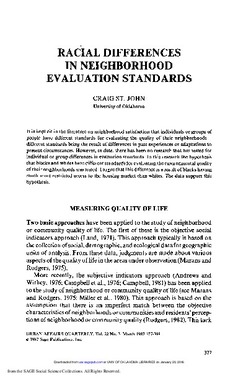| dc.contributor.author | Craig St. John | |
| dc.date.accessioned | 2016-01-14T19:52:47Z | |
| dc.date.accessioned | 2016-03-30T15:34:38Z | |
| dc.date.available | 2016-01-14T19:52:47Z | |
| dc.date.available | 2016-03-30T15:34:38Z | |
| dc.date.issued | 1987-03-01 | |
| dc.identifier.citation | John, C. S. (1987). Racial Differences in Neighborhood Evaluation Standards. Urban Affairs Review, 22(3), 377-398. doi: 10.1177/004208168702200302 | en_US |
| dc.identifier.uri | https://hdl.handle.net/11244/24899 | |
| dc.description.abstract | It is implicit in the literature on neighborhood satisfaction that individuals or groups of people have different standards for evaluating the quality of their neighborhoods—different standards being the result of differences in past experiences or adaptations to present circumstances. However, to date, there has been no research that has tested for individual or group differences in evaluation standards. In this research the hypothesis that blacks and whites have different standards for evaluating the environmental quality of their neighborhoods was tested. I argue that this difference is a result of blacks having much more restricted access to the housing market than whites. The data support this hypothesis. | en_US |
| dc.language.iso | en_US | en_US |
| dc.publisher | Urban Affairs Review | |
| dc.title | Racial Differences in Neighborhood Evaluation Standards | en_US |
| dc.type | Research Article | en_US |
| dc.description.peerreview | Yes | en_US |
| dc.description.peerreviewnotes | https://us.sagepub.com/en-us/nam/manuscript-submission-guidelines | en_US |
| dc.identifier.doi | 10.1177/004208168702200302 | en_US |
| dc.rights.requestable | false | en_US |
